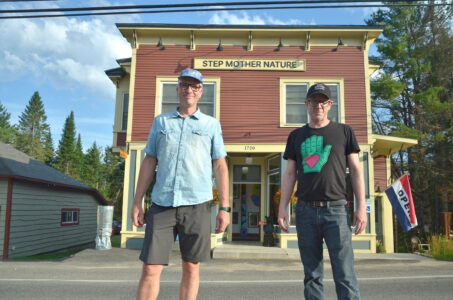ROOST: Raise bed tax to fund local projects
Tourism group asks Essex County to increase occupancy tax from 3 to 5%

From left, Regional Office of Sustainable Tourism CEO Jim McKenna and Chief of Staff Mary Jane Lawrence talk about ROOST’s proposal to raise the Essex County occupancy tax at their offices in Lake Placid Friday. (Enterprise photo — Griffin Kelly)
LAKE PLACID — The Regional Office of Sustainable Tourism is looking to raise the Essex County occupancy from 3 percent to 5 percent. The added 2 percent would go toward community development.
The occupancy tax, which totaled close to $3 million last year from Essex County lodging customers, goes solely toward ROOST and its tourism and marketing efforts for the county. If approved by the Essex County Board of Supervisors, an additional 2 percent, which in the current market would total roughly $2 million, would go toward a “Community Enhancement Fund.”
ROOST CEO Jim McKenna and Chief of Staff Mary Jane Lawrence said the idea is to help strengthen communities for both the locals and visitors.
“The tourism is only as good as a community,” Lawrence said, “and we know we’re facing challenges: areas like affordable housing, workforce and, to a certain extent, the quality of life.”
“If you don’t have a good community experience, you don’t have a good tourism experience,” McKenna added.
It isn’t entirely clear yet what these community development projects would be, but Lawrence said ROOST plans to work with governments and local nonprofit organizations to see what issues the additional funds could go toward. She threw out some quick examples such as infrastructure, sidewalk and building facade repairs. McKenna suggested money gained from the increased tax could go toward projects like a performance center in Ticonderoga, updated hiking trails in Crown Point and frost rails on Lake Placid’s toboggan run to keep it going in above-freezing weather.
All of the towns in Essex County fall into one of four ROOST regions: Lake Placid and High Peaks, Whiteface, Lake Champlain and Schroon Lake. Lawrence said each region would have its own committee that decides how the additional funds would be spent. Occupancy tax collected can only go toward the region in which it was raised. For example, occupancy tax money collected in the town of North Elba (which includes Lake Placid and part of Saranac Lake) can’t go toward marketing efforts in Ticonderoga. The Lake Placid and High Peaks region collects about 85 percent of the total occupancy tax every year in Essex County.
McKenna said ROOST is modeling the new concept after a similar project in Asheville, North Carolina.
McKenna said the plan is to get the increased tax implemented by the start of 2020.
McKenna and Lawrence said the local hotel owners and county officials they talked to so far don’t seem to be opposed to the tax increase.
“We didn’t talk to everyone, but we didn’t get any discouragement to move this forward,” Lawrence said.
–
Town supervisors
–
Essex County Board of Supervisors Chair Shaun Gillilland, of Willsboro, said the idea of raising money through the occupancy for economic development outside of the High Peaks Region is something the board is interested in.
“This would be additional revenues for towns that don’t currently have it,” he said. “I would say tentatively I have a positive response to it.”
However, Gillilland said details are still a little scarce right now and that some supervisors aren’t entirely sold on the idea.
Minerva Supervisor Stephen McNally said he’s not opposed to the tax, but he is opposed to how the money would be distributed. He’d prefer to bypass the application process and just have the individual towns decide how they want to spend the money.
North Hudson Supervisor Stephanie DeZalia shared McNally’s view.
“Our town could definitely use the revenue, but how it gets divided up needs to be looked at,” she said.
–
Lodging owners
–
Huda Sheidelman and Rudy Younger both own short-term rental in Lake Placid. They both think the current 3 percent occupancy should be reviewed before increasing it.
“The right thing to do is to look at the money that is allocated now and see if some of that could go toward the community,” Sheidelman said.
“Why go up when you can take from the existing pool?” Younger said.
Younger said it’s not a bad idea to raise the tax for community development, but the extra cost ultimately impacts customers and could have a negative impact on businesses.
“When taxes raise, you pass those costs onto the guests,” he said. “(Home-sharing) services like Airbnb, VRBO and HomeAway already take 6 to 12 percent from every transaction. This would only add to it. Costs just keeping going up.”
Aaron Woolf, who owns the Deer’s Head Inn in Elizabethtown, said bringing visitors to the area in new and creative ways is a vital part of the county’s economic future. He would like to see the money go toward community development beyond the Lake Placid area.
“It seems to me we have an opportunity to support different areas and activities,” he said Friday. “It’s not just hiking and skiing in the High Peaks. There are other areas with things like agritourism and mountain biking that could help reduce overuse in the traditional areas.
“I would like to see it used in ways that would reflect the next tourist economy and not the last one.”
Art Devlin, who owns the Olympic Motor Inn in Lake, said he’s not sure if he’s for or against the tax raise at this point. Devlin is also deputy mayor on the Lake Placid Village Board of Trustees.
“I was on the ROOST board in the ’90s when they wanted to start the occupancy tax,” he said. “I was for it then, but I’m not sure about raising it now.”




